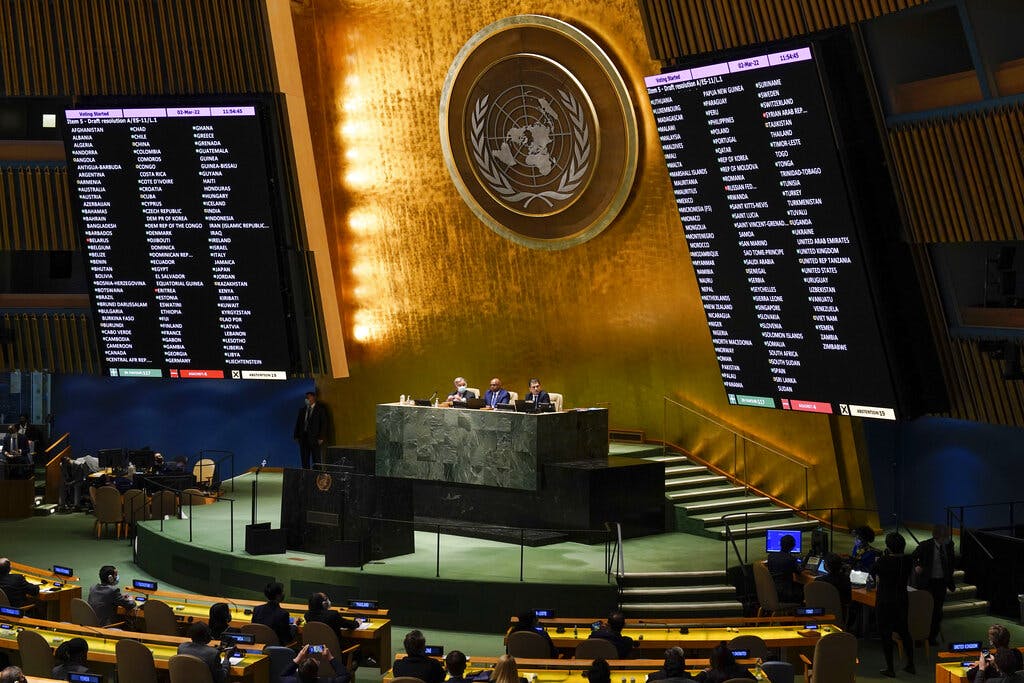Countering the Argument That Israel Isn’t Backing Ukraine
Israel reportedly convinced some Arab allies, including a Security Council member, the United Arab Emirates, to join the resolution at the United Nations.

Israel is starting to push back against critics — including President Zelensky — who suggest it has been lacking in support of Ukraine.
The issue has been percolating since early in the week, when CNN’s Christiane Amanpour tweeted:
“Israel is a close ally of the US, yet has not supported the US over Ukraine.”
In her tweet she quoted a former American defense secretary, William Cohen, as saying that he was “deeply disappointed” that Israel has “not supported the United States,” and adding: “They do have to make a decision here.”
Ms. Amanpour posted a video of her interview in which Mr. Cohen also expressed understanding of the security needs that led to Israel’s initial hesitance to vocally condemn Russia’s invasion. Nevertheless, the “Israel isn’t on our side” meme is by now engrained in much of the press.
What is it all about?
Ms. Amanpour’s tweet came after a story made the rounds detailing Israel’s approach to an American resolution put before the United Nations Security Council. Israel doesn’t have a vote at the council, but critics noted that Israel declined to join 81 countries, including non-council members, that co-sponsored the American resolution to condemn Russia and demand it end the assault on Ukraine. The resolution, as everyone knew it would in advance, failed after Russia vetoed it.
Yet the story of how the American ambassador to the world body, Linda Thomas Greenfield, personally read the riot act to her Israeli counterpart, Gilad Erdan, was widely distributed.
By Wednesday, though, U.N. ambassadors were applauding their own success in passing a nonbinding resolution at the General Assembly that was opposed by only four countries, including Russia. Israel sponsored that writ and Ambassador Noa Furman condemned Russia in a speech.
Even then, nitpickers wondered out loud why Ms. Furman, who is Mr. Erdan’s deputy, delivered the speech rather than the man at the top. Such palaver led to much finger wagging over whether Israel has made a choice to, as the Obama-era cliché goes, be on the “right side of history.”
To understand what was behind Jeruslaem’s initial habitations, we turn to an Israeli author, David Hazony. “It’s really simple,” he tweeted. “We have a hostile border, with Russia on the other side.” He was referring to Israeli efforts to limit the attempts of Iranian and Hezbollah forces to make permanent bases in Syria — where Russia has air superiority — for the purpose of attacking Israel.
This explains Prime Minister Bennett’s reluctance, at first, to specifically name Russia in remarks opposing the war in Ukraine. Later on he condemned Russia, but by then, as more stories about Israel hedging its bets appeared, even staunch supporters — such as Senator Graham — started to question Israel’s loyalty.
Yesterday, though, Mr. Graham changed his tune, tweeting about a meeting with the Israeli ambassador in Washington, Michael Herzog: “Truly appreciate Israel’s support for today’s UN resolution condemning Russia’s aggression against Ukraine. I am pleased Israel is helping Ukraine in a very robust manner.”
Another about face came from the American ambassador in Jerusalem, Tom Nides.
“Enormous thanks,” he wrote, “to Israel for helping rally more members to stand with Ukraine in today’s historic @UN vote. Over 141 votes to hold Russia accountable. Diplomacy matters.”
Israel reportedly convinced some Arab allies, including a Security Council member, the United Arab Emirates, to join the resolution after initially planning to abstain.
Meanwhile, beyond the Turtle Bay theater, Israel offered to send a field hospital and other humanitarian assistance to Ukraine. Yet, detractors maintain that its help is not enough, and Jerusalem must send arms and the Iron Dome missile defense system to Ukraine.
As the Ukrainian ambassador in Tel Aviv, Yevgen Korniychuk, made clear, Iron Dome is not what his country needs. Nevertheless, the ambassador told reporters that Israel’s support is not enough. Mr. Korniychuk went a step too far in the eyes of many Israelis when he cited the help Ukrainians gave to Jews during the Holocaust.
In a press conference at Kyiv today, President Zelensky, who is Jewish, was asked about Israel’s support. He said he saw, and appreciated, Israelis who were praying at the Western Wall while clad in the Ukrainian flag. And while his country’s standing with Israel is good, he said, “relations are tested at times of trouble, and I don’t feel the Israeli Prime Minister is clad in the Ukrainian flag.”
During his press conference, Mr. Zelensky also called on America to create a no-fly zone over his country, which Washington so far has rejected out of hand.
Mr. Bennett yesterday spoke twice with Mr. Zelensky and once with President Putin. He maintains that his role, as one of the only leaders who has good relations with both, is as a potential mediator.
The bottom line is that Israel, like everyone else in this drama, needs to balance moral obligations to stand with a country valiantly battling a vicious invader and its own security calculations — including battling vicious neighbors that want to do to it what Russia is doing to Ukraine.

